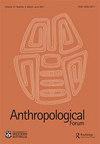参与社会人类学与马来西亚原住民土地主张
IF 0.7
3区 社会学
Q3 ANTHROPOLOGY
引用次数: 0
摘要
【摘要】诉讼的运用已成为马来西亚半岛原住民原住民(Orang Asli)习惯性土地主张的重要策略。越来越多的人被迫离开他们的习惯领土,并且已经用尽了其他官方途径,土著人民正在诉诸法律措施来保护他们的权利。马来西亚法院审理的几起有利于原住民权利的里程碑式案件给了土著人民在法律体系中的希望。然而,诉讼是有风险的,需要大量的时间和资源,并对社区和其他参与过程的人造成损害。依赖法院程序可能会使国家权力具体化,重新确立不平等的权力动态,并强化本土“文化”和“传统”的本质概念。在这篇文章中,我利用我对阿斯利原住民行动主义的长期研究,以及我在几个阿斯利原住民传统土地索赔中担任专家证人的经验,来讨论社会人类学知识在法律领域的局限性和可能性。专注于马来西亚的背景,我反思了在不同领域说话的挑战,将社会人类学研究转化为法律程序可读的形式,以及在物化知识等级方面共谋的困境。我考虑社会人类学家在他们的文化专业角色中如何利用法律空间来集中土著知识,并挑战对土著文化和传统的更静态的理解。我衷心感谢James Rose博士、Miriam Shakow博士、Yogeswaran Subramaniam博士、Hon Kai Ping先生和Saha Deva A. Arunasalam先生的专业知识和宝贵意见。我非常感谢匿名审稿人和期刊编辑提供的有见地的反馈,这些反馈极大地改进了这篇文章。我还要感谢法律顾问、司法当局和律师协会原住民权利委员会。我要感谢阿斯利村的村民们,他们慷慨地分享了他们的时间、空间和见解,我也要感谢他们在我问询期间的盛情款待。感谢马来亚大学性别研究方案和艺术与社会科学学院的体制支持,使这项工作成为可能。披露声明作者未报告潜在的利益冲突。Notes1 Sagong本Tasi指数和口服补液盐诉‧Negeri雪兰莪州和口服补液盐[2002]2 MLJ 591.2在2018年大选后改变了政府1957.3年马来西亚独立以来首次一些例子,Ketua Pengarah Jabatan哈尔Ehwal Ehwal原始人&携带者v穆罕默德·本·能剧(乡下来Batin Bukit韩国)和口服补液盐和另一个吸引[2015]6 MLJ 527(上诉法院、马来西亚),口服补液盐Yebet bt萨曼& v Foong葵长和口服补液盐[2015]2 MLJ 498(上诉法院、马来西亚)3 . Eddy Salim & Ors诉依斯干达地区发展局& Ors [2017] 1 LNS 122(高等法院,新山,马来西亚)Kamal Solhami博士是另一位社会人类学家,近年来在奥朗阿斯利法庭案件中担任专家证人土著权利倡导者科林·尼古拉斯博士编写了早期关于土著居民习惯土地案件的专家报告。他是关注原住民权利的非政府组织“原住民关注中心”(COAC)的协调员。他的专业知识在几起原住民土地索赔案件中发挥了至关重要的作用Gajah Batu是一个笔名。本文章由计算机程序翻译,如有差异,请以英文原文为准。
Engaged Social Anthropology and Indigenous Land Claims in Malaysia
ABSTRACTThe use of litigation has become an important strategy for customary land claims for the Orang Asli, the aboriginal people of Peninsular Malaysia. Increasing displacement from their customary territories, and having exhausted other official avenues, the Orang Asli are resorting to legal measures to protect their rights. Several landmark cases in the Malaysian courts favouring Orang Asli rights have given the Indigenous People hope in the legal system. However, lawsuits are risky, require an enormous amount of time and resources, and take a toll on the communities and others involved in the process. Relying on the court process risks reifying state power, reinscribing unequal power dynamics, and reinforcing essentialised notions of indigenous ‘culture’ and ‘tradition’. In this article, I draw upon my long-term research on Orang Asli activism and my experience serving as an expert witness in several Orang Asli customary land claims to discuss the limits and possibilities of social anthropological knowledge in the legal arena. Focusing on the Malaysian context, I reflect upon the challenges of speaking across different fields, translating social anthropological research into a form legible to the legal process, and the dilemma of being complicit in reifying hierarchies of knowledge. I consider how social anthropologists in their cultural expertise role might use the legal space to centre Indigenous knowledge, and challenge the more static understanding of indigenous culture and tradition.KEYWORDS: Expert witnesscultural expertisecultural translationcustomary land claimscustomary territory AcknowledgementsI extend my sincere thanks to Dr. James Rose, Dr. Miriam Shakow, Dr. Yogeswaran Subramaniam, Mr. Hon Kai Ping and Mr. Saha Deva A. Arunasalam for their expertise and valuable comments. I am grateful to the anonymous reviewers and the journal editors for their insightful feedback, which significantly improved this article. My appreciation also goes to the legal counsels, judicial authorities, and the Bar Council Committee on Orang Asli Rights. I am indebted to the Orang Asli villagers who generously shared their time, space, and insights, and to whom I am grateful for their kind hospitality throughout my inquiries. Thank you to the Gender Studies Programme and the Faculty of Arts and Social Sciences at Universiti Malaya for their institutional support that made this work possible.Disclosure StatementNo potential conflict of interest was reported by the author(s).Notes1 Sagong bin Tasi & Ors v. Kerajaan Negeri Selangor & Ors [2002] 2 MLJ 591.2 The 2018 election saw a change in government for the first time since Malaysia’s independence in 1957.3 Some examples, Ketua Pengarah Jabatan Hal Ehwal Ehwal Orang Asli & Anor v Mohamad Bin Nohing (Batin Kampung Bukit Rok) & Ors and another appeal [2015] 6 MLJ 527 (Court of Appeal, Malaysia), Yebet bt Saman & Ors v Foong Kwai Long & Ors [2015] 2 MLJ 498 (Court of Appeal, Malaysia), Eddy Salim & Ors v Iskandar Regional Development Authority & Ors [2017] 1 LNS 122 (High Court, Johor Bahru, Malaysia).4 Dr. Kamal Solhami is another fellow social anthropologist who has taken the role of expert witness for Orang Asli court cases in recent years.5 The earlier expert reports for Orang Asli customary land cases were produced by Indigenous rights advocate, Dr. Colin Nicholas. He is coordinator of the Centre for Orang Asli Concerns (COAC), an NGO focussing on Orang Asli rights. His expertise played a vital role in substantiating several Orang Asli land claim cases.6 Gajah Batu is a pseudonym.
求助全文
通过发布文献求助,成功后即可免费获取论文全文。
去求助
来源期刊

Anthropological Forum
ANTHROPOLOGY-
CiteScore
3.60
自引率
10.00%
发文量
14
期刊介绍:
Anthropological Forum is a journal of social anthropology and comparative sociology that was founded in 1963 and has a distinguished publication history. The journal provides a forum for both established and innovative approaches to anthropological research. A special section devoted to contributions on applied anthropology appears periodically. The editors are especially keen to publish new approaches based on ethnographic and theoretical work in the journal"s established areas of strength: Australian culture and society, Aboriginal Australia, Southeast Asia and the Pacific.
 求助内容:
求助内容: 应助结果提醒方式:
应助结果提醒方式:


